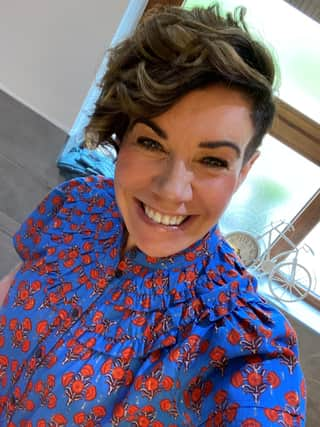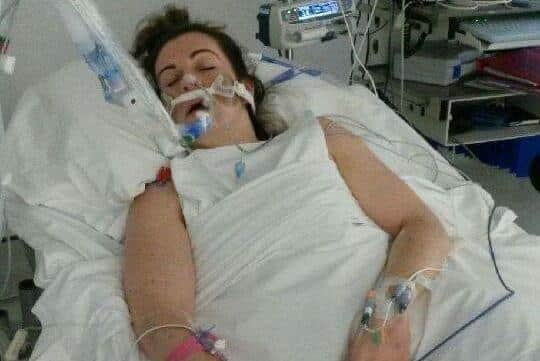Clodagh Dunlop: Breaking free from locked in syndrome to help others


Clodagh Dunlop’s life took a dramatic turn eight years ago, when, at the age of 35 and working as a police officer, she had a brainstem stroke which left her completely paralysed, but fully conscious and only able to communicate through blinking. She had locked-in syndrome, which affects around one per cent of people who have a stroke.
It is extremely rare for patients to recover any significant motor functions, but due to determination and hard work, Clodagh has recovered well and is now a volunteer for Northern Ireland Chest Heart & Stroke (NICHS).
Advertisement
Hide AdAdvertisement
Hide AdRecalling what happened, Clodagh said: “I had been unwell and believed I was having a stroke. I asked my sister to call an ambulance. I was taken to a local hospital and as I was waiting in A&E I had a brainstem stroke. I was transferred to the Royal Victoria Hospital in


Belfast where I had surgery and a massive blood clot removed from my brainstem. I
was given a 50/50 chance of survival.”
Thankfully, Clodagh survived but she was to stay in hospital in Belfast for nearly eight
months, fighting through an experience most people would consider their worst
nightmare.
Advertisement
Hide AdAdvertisement
Hide Ad“When I woke up in the Intensive Care Unit after my surgery it was a terrifying experience. I couldn’t move a muscle but inside my head I was screaming ‘I’m here!’ I was a prisoner in my own body.”
For almost three months Clodagh was unable to move or speak. She could only
communicate by blinking, but her mind remained completely alert, and she was fully
aware of everything that was happening around her. Eventually Clodagh started to
Advertisement
Hide AdAdvertisement
Hide Adshow some signs of recovery and was transferred to the Brain Injury Unit at
Musgrave Park Hospital, Belfast where she had to learn to breathe, swallow, walk
and talk again.
On discharge from hospital, Clodagh completed Northern Ireland Chest Heart & Stroke’s Post Rehab Exercise Programme (PREP) and her relationship with the charity began.
She said: “I spent a long time in hospital and, like many people who suffer a
Advertisement
Hide AdAdvertisement
Hide Adsignificant stroke, when I was discharged the services came to an abrupt stop. This
had a real impact on my mental health and wellbeing, particularly as a young stroke
survivor. There was a real void in aftercare and unfortunately it led to me having
suicidal thoughts- but into that void came NICHS and their PREP programme.
Advertisement
Hide AdAdvertisement
Hide Ad“With PREP I was in a community where people were able to understand
me and what I was going through. I wasn’t the only one whose life was changed by
stroke. I was able to talk to people openly and honestly. Stroke survivors would say,
‘This is difficult, it is challenging, but you can go on to thrive and live a full life.’ That
was what I needed to hear for my wellbeing.”
Advertisement
Hide AdAdvertisement
Hide AdClodagh found the benefits of PREP so great she was keen to give something back
to the charity.
“NICHS may not realise how important PREP was to me, but the group was a turning point in my wellbeing and mental health post-stroke. Stroke will always be a part of my life; I have made a good recovery but do have disabilities from my stroke. I am back at work full-time (as a detective in the PSNI). It pains me that other stroke survivors are still going through what I experienced, in that services stop abruptly on discharge from hospital. The impact of this should not be underestimated.”
Clodagh has been a volunteer community ambassador with NICHS for five years.
“I volunteer as a way to give back to my community and say thank you for what the
Advertisement
Hide AdAdvertisement
Hide Adcharity has done for me. I want to raise awareness and hopefully, in turn, money so
NICHS can continue to help as many people as possible.”
Caoimhe Devlin, head of HR and Volunteering at Northern Ireland Chest Heart &
Stroke said; “We are so grateful for all the help and support Clodagh gives to our
charity and we would like to take this opportunity to thank her, and all our other
Advertisement
Hide AdAdvertisement
Hide Advolunteers. Volunteering with NICHS really will make a profound difference to the lives of local people and anyone interested in being part of this can find out more at www.nichs.org.uk/how-you-can-help/volunteering .”
Clodagh’s has written about her extraordinary road to recovery in her memoir, A Return to Duty, which is available in all good book stores and on Amazon.